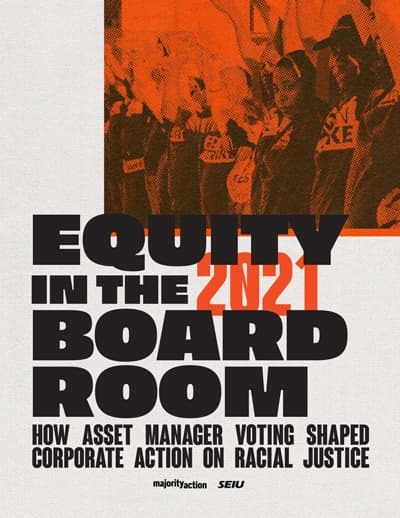Equity in the Boardroom: How Asset Manager Voting Shaped Corporate Action on Racial Justice in 2021

Each week, workers invest their hard-earned dollars to save for retirement. These nest eggs are largely overseen by asset managers, a type of financial professional who invests the money on behalf of workers in corporate businesses to ensure it grows. But what if we told you that asset managers have largely used their role to support white supremacy? How? By rubber stamping all white corporate boards of directors, blocking racial equity audits of companies, undermining our democracy and supporting political candidates connected to the Jan. 6 insurrection. It’s true and it must stop!
Despite the myriad of commitments corporations made in 2020 amidst the nation’s racial uprisings against racial injustice and police brutality, since then, many of these pledges have been reversed, unfulfilled, or quietly shelved. Asset managers have largely failed to hold corporations accountable to their commitments. In our new report, Equity in the Boardroom. How Asset Manager Voting Shaped Corporate Action on Racial Justice in 2021, produced collaboratively with Majority Action, we detail shows asset managers have:
- Blocked racial equity audit proposals at companies like Amazon;
- Opposed greater transparency on political spending and lobbying; and
- Supported all-white Board of Directors, despite investor calls for increasing board diversity – a strategy shown to improve business outcomes.
These actions harm the financial interests of workers, uphold white supremacy, and use the hard-earned dollars of workers to oppose their economic, social and political interests. This is unacceptable.
The report concludes that large asset managers must use their power and responsibility to promote racial justice by:
- Holding boards accountable to the corporate governance best practice of diversifying boards to ensure that the perspectives of Black and brown communities are represented at the highest level of corporate decision-making.
- Holding companies accountable to improving disclosure of corporate policy influence that directly and indirectly impacts Black and brown communities.
- Supporting resolutions that seek to improve oversight of risks driven by systemic racism.
Updated January 5, 2022